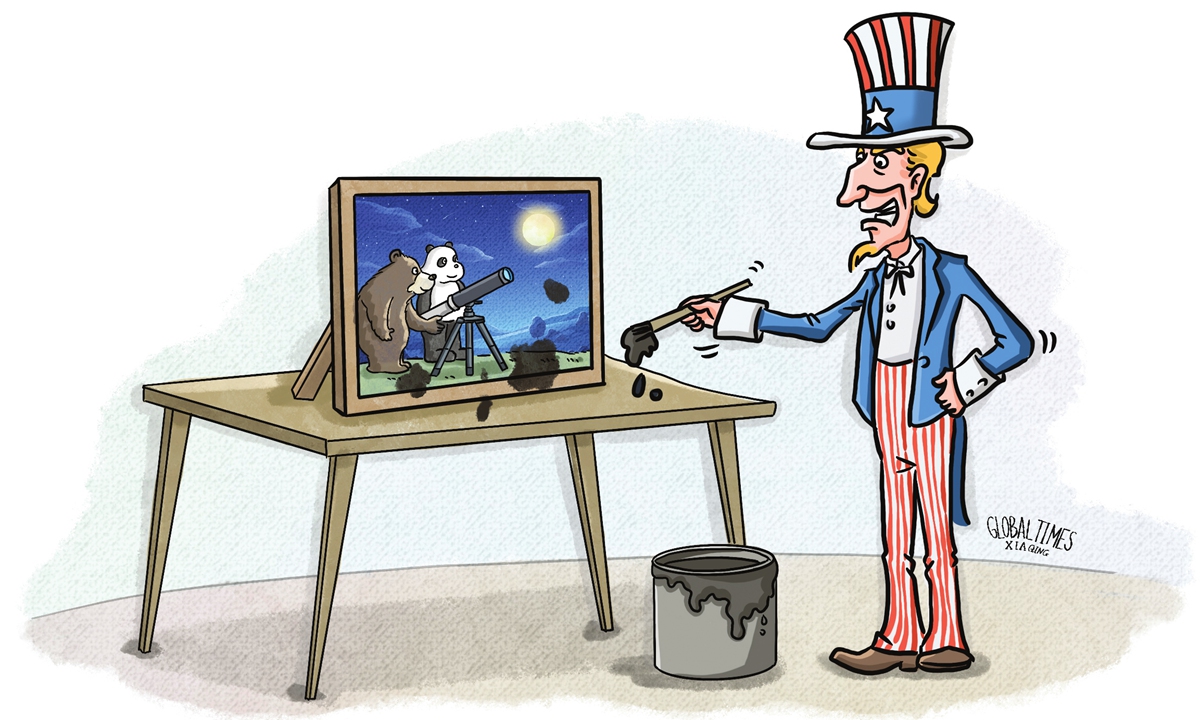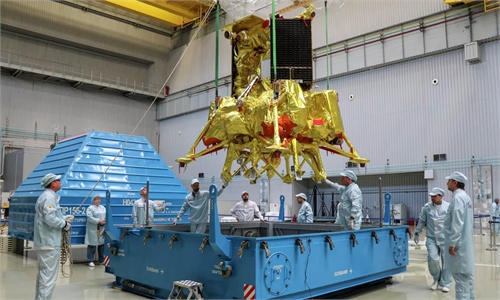
Illustration: Xia Qing/GT
On Sunday local time, Russia's space agency, Roscosmos, said it lost touch with the Luna-25 spacecraft, a Russian lunar lander. According to a "preliminary analysis," Luna-25 "switched to an off-design orbit" before crashing into the moon's surface. This incident serves as a clear demonstration that lunar exploration is not an easy task and requires international collaboration. Expectedly, some US media outlets didn't miss the chance to discredit China-Russia joint lunar exploration effort and sow discord. A Bloomberg article on Monday claimed Russia's moon failure would undermine its space partnership with China.
First and foremost, the China-Russia joint lunar exploration aligns with scientific principles. Space exploration is a shared task of humanity, as it is not only essential for technological advancement but also a necessary condition for protecting the environment for human survival. The collaborative China-Russia effort to explore the moon holds immense significance for humanity's understanding of the moon and for advancements in the field of cosmic science.
From the perspective of driving scientific development, the international community should unite and collaborate in research, pooling resources to leverage each other's strengths and address weaknesses. Taking the International Space Station (ISS) as an example, the collaborative efforts of countries like Russia and the US have significantly lowered the launch and operational costs of the ISS. This has effectively enhanced the efficiency of cosmic research, fostering technological advancements in humanity's exploration of space through complementary strengths. Currently, China, the US and Russia have all proposed plans to establish permanent research bases on the moon.
However, the realization of such plans requires substantial financial investments. For instance, the US announced its lunar exploration plans in 2020, estimating a minimum investment of $30 billion. The considerable investment in a single scientific project presents financial and technical risks. While humans possess the technology for lunar flybys, landings, returns and manned exploration, there remain numerous technical challenges to be addressed for establishing a permanent research base on the moon. Collaborative research not only helps mitigate technical risks but also reduces the economic pressure associated with such research.
Furthermore, China-Russia collaboration possesses the necessary political mutual trust required for space research. Exploring the cosmos and space development are core technologies of major countries, symbolizing a country's comprehensive strength. Therefore, political and security mutual trust has become a vital prerequisite for international space cooperation. Currently, only a handful of countries possess the capabilities for space research and exploration, and even fewer are willing to engage in broad collaborative efforts in these fields.
The US has rich experience in space exploration and research and should work together with the international community to promote progress in this field. However, it has set many political and security barriers to international cooperation. Against the backdrop, China has been unable to participate in international space station and space exploration activities, which in turn has driven China's independent innovation.
In recent years, there have been frequent obstacles to space cooperation between Russia and the West. The large-scale economic sanctions and technological blockade imposed by the West on Russia have affected their space cooperation research. In July 2022, Russia announced it would quit the International Space Station after 2024. Since the beginning of the 21st century, China and Russia have started regular exchanges in the field of space, exploring the possibility of cooperation in lunar exploration. In March 2021, the governments of China and Russia officially launched the International Lunar Research Station (ILRS) project, marking a new stage of cooperation between the two countries in the field of space. Currently, the moon landing phase of China's crewed lunar exploration program has started, with the main goal of sending Chinese astronauts to land on the moon for the first time by 2030.
Finally, attempts to smear joint space exploration for political purposes will ultimately fail. Cooperative space exploration should be a scientific mission for all of humanity. From a technological and financial perspective, multinational cooperation should be the optimal choice. China has always maintained an open attitude toward cooperative space exploration and has expressed its willingness to open its Tiangong space station to the world after its completion. As of January this year, nine experiment projects from 17 countries and 23 entities have been included in the first group of projects for the space station. International cooperation has also been a major direction for Russia's space development. Due to the US' arbitrary use of technological blockades, economic sanctions and other ideological tools to undermine international aerospace cooperation, cooperation between the US and Russia in space research has come to an end.
The US has closed the door to international space cooperation, but it is trying to discredit cooperation between China and Russia. This not only goes against the spirit of science but also attempts to extend the zero-sum Cold War mentality from Earth to space. This is detrimental to maintaining stability in the international order and hinders the progress of science and technology.
The author is a researcher at the Institute of Russia, Eastern Europe and Central Asia Studies, Chinese Academy of Social Sciences. opinion@globaltimes.com.cn


